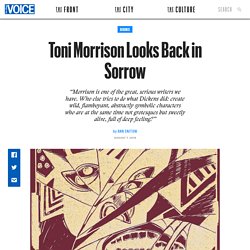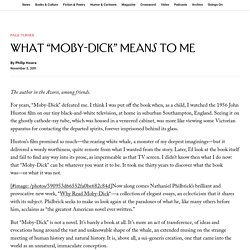

Toni Morrison Looks Back in Sorrow. Death Duties: Toni Morrison Looks Back in SorrowSeptember 8, 1987 The subject of Toni Morrison’s new novel, Beloved, is slavery, and the book staggers under the terror of its material — as so much holocaust writing does and must.

Morrison’s other novels teem with people, but in Beloved half the important characters are dead in the novel’s present, 1873. Though they appear in memory, they have no future. Slavery, says one character, “ain’t a battle; it’s a rout” — with hardly any of what one could confidently call survivors. Louise Erdrich's Love Medicine: Loving Over Time and Distance. Many Native American novels deal with specific Indian American issues, such as reservation life and the problems of relocation and termination.

Love Medicine. Louise Erdrich1983IntroductionAuthor BiographyPlot SummaryCharactersThemesStyleHistorical ContextCritical OverviewCriticismSourcesFor Further Study Louise Erdrich1983 Introduction When Louise Erdrich and her husband, Michael Dorris, first sent Love Medicine to publishers, they received nothing but polite rejections.

Finally, Dorris decided to promote the book himself and was successful. Holt published the book in 1983, and it became an immediate best seller. Love Medicine has won many awards for Erdrich's ability to demonstrate the differences among individuals within the sameness of their culture. Author Biography. 'Love Medicine,' Etc. To the Editor: In his review of Julian Barnes's novel ''Love, Etc.'' (Feb. 25), a sequel to ''Talking It Over,'' Sven Birkerts claims that the previous novel ''pioneered, if not invented, the technique of having characters alternately speaking about their lives, giving their versions of events off the page.'' I'm an admirer of Barnes's fiction, but I find this remark curious at best.

The technique is hardly revolutionary. Several writers come to mind who did the same well before Barnes. Jon Anderson Fort Worth To the Editor: BOOKS OF THE TIMES; Pages.

Holt, Rinehart & Winston. $13.95. THERE are at least a dozen of the many vividly drawn people in this first novel who will not leave the mind once they are let in. Their power comes from Louise Erdrich's mastery of words. NYTimes. WHERE I OUGHT TO BE: A WRITER'S SENSE OF PLACE. In her essay ''Place in Fiction,'' Eudora Welty speculates that the loss of place might also mean the loss of our ability to respond humanly to anything.

She writes: ''It is only too easy to conceive that a bomb that could destroy all traces of places as we know them, in life and through books, could also destroy all feelings as we know them, so irretrievably and so happily are recognition, memory, history, valor, love, all the instincts of poetry and praise, worship and endeavor, bound up in place.'' I don't know whether this is true. "Huck Finn" is not about race: The real subtext of Twain's masterpiece. "A committee of the public library of your town have condemned and excommunicated my last book," Mark Twain wrote to the secretary of Concord Free Trade Club in 1885, "and doubled its sales.

" The book that was the object of what Twain called "this generous action," was "The Adventures of Huckleberry Finn," a novel that would go on to be banned here and there in schools and libraries for the next 130 years. Today, "Huckleberry Finn" is most often banned for its use of the N-word. (If there's an argument for the legitimacy of Twain printing it, I can't imagine one to justify its appearance in a humble book review, so I'll be euphemizing it here.) But that came later; the book would not be censured for containing "passages derogatory to negroes" until 1957, when it was removed from the curricula of elementary schools in New York.
This is not to say that the Concord library committee wasn't offended by the N-word back in 1885; it probably was. Race is another matter. What “Moby-Dick” Means to Me. The author in the Azores, among friends.

For years, “Moby-Dick” defeated me. I think I was put off the book when, as a child, I watched the 1956 John Huston film on our tiny black-and-white television, at home in suburban Southampton, England. Seeing it on the ghostly cathode-ray tube, which was housed in a veneered cabinet, was more like viewing some Victorian apparatus for contacting the departed spirits, forever imprisoned behind its glass.
Huston’s film promised so much—the rearing white whale, a monster of my deepest imaginings—but it delivered a wordy worthiness, quite remote from what I wanted from the story. Later, I’d look at the book itself and fail to find any way into its prose, as impermeable as that TV screen. [#image: /photos/590953d66552fa0be682c84d]Now along comes Nathaniel Philbrick’s brilliant and provocative new work, “Why Read Moby-Dick“—a collection of elegant essays, an eclecticism that it shares with its subject.
But “Moby-Dick” is not a novel.